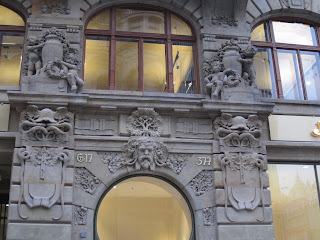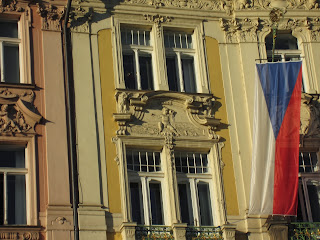Friday, 31 January 2014
Thursday, 30 January 2014
Manners Maketh the Eamonn
Knock, knock; who's there?; Eamonn; Eamonn who?; Eamonn Old Etonian, who are you.
It's the way I tell them, isn't it? And, guess what, that's not even the worst joke I know. However, it is the most relevant to my current preoccupation with the state of youthful behaviour and the problems of education, as revealed by a BBC documentary series about young teachers.
In this context, I came across an interesting insight from a Hungarian who became a refugee in Britain in 1949. It is included in Comrade Baron by Jaap Scholten, an intriguing book that seems to be very difficult to obtain outside of Hungary. Scholten asks the man what it is that allows Eton to, as he puts it, "calmly go on producing adventurers and eccentrics in this egalitarian age". This is the reply he receives:
"'It's very simple,' he said. 'At the average school you don't learn manners. You're put into a mould and taught how to think. At public schools like Eton you learn how to behave ... you learn how to greet someone and how to get along with all kinds of different people, those formalities that seem so pointless. In short, although you learn manners, you're left completely free in your thinking. That's why those schools produce students with true freedom of mind, whereas the state schools turn out people who think in the obligatory cliches: perfect bureaucrats.'"
It's the way I tell them, isn't it? And, guess what, that's not even the worst joke I know. However, it is the most relevant to my current preoccupation with the state of youthful behaviour and the problems of education, as revealed by a BBC documentary series about young teachers.
In this context, I came across an interesting insight from a Hungarian who became a refugee in Britain in 1949. It is included in Comrade Baron by Jaap Scholten, an intriguing book that seems to be very difficult to obtain outside of Hungary. Scholten asks the man what it is that allows Eton to, as he puts it, "calmly go on producing adventurers and eccentrics in this egalitarian age". This is the reply he receives:
"'It's very simple,' he said. 'At the average school you don't learn manners. You're put into a mould and taught how to think. At public schools like Eton you learn how to behave ... you learn how to greet someone and how to get along with all kinds of different people, those formalities that seem so pointless. In short, although you learn manners, you're left completely free in your thinking. That's why those schools produce students with true freedom of mind, whereas the state schools turn out people who think in the obligatory cliches: perfect bureaucrats.'"
Wednesday, 29 January 2014
Priorities
The BBC has produced a series called Tough Young Teachers. It is about young graduates working for the Teach First scheme in Britain. The programmes I have seen have been riveting, although I expect there are many, many people who have been rejected for the scheme who are watching open-mouthed and wondering what on earth the selection panel were thinking of when they chose some of the people they did choose, instead of them.
I'm not a fan of reality television and I can see that I am not being given the full picture on what each young teacher is doing. All the same, there is so much of interest revealed in these shows - above all the startling lack of any respect for the authority of teachers among many of the students the Teach First recruits are supposed to deal with. The children get away with ridiculous behaviour, and I found it particularly sad to see a boy who is clearly exceptionally bright wasting time by arguing the toss over whether or not he should be treated as the equal of his teacher. You can only laugh with frustration when he insists that it's ageism to suggest that, because someone's older than you, they might know a bit more than you do. Such a clever child, wasting his opportunities.
However, what I found really shocking was a sequence in which one of the young graduates goes to his graduation and meets up with some of his friends from university. They have all studied civil engineering and this young man has decided to become a maths teacher. One of his friends cross questions him about how he could make such a decision, given how hopeless a teacher's pay is, compared to that of an engineer. Later, interviewed on his own, the friend expresses the view that the young maths teacher will quit teaching before too long and 'go on to great things'. Surely becoming a really good teacher is going on to great things. Do status and income always have to go hand in hand:
I'm not a fan of reality television and I can see that I am not being given the full picture on what each young teacher is doing. All the same, there is so much of interest revealed in these shows - above all the startling lack of any respect for the authority of teachers among many of the students the Teach First recruits are supposed to deal with. The children get away with ridiculous behaviour, and I found it particularly sad to see a boy who is clearly exceptionally bright wasting time by arguing the toss over whether or not he should be treated as the equal of his teacher. You can only laugh with frustration when he insists that it's ageism to suggest that, because someone's older than you, they might know a bit more than you do. Such a clever child, wasting his opportunities.
However, what I found really shocking was a sequence in which one of the young graduates goes to his graduation and meets up with some of his friends from university. They have all studied civil engineering and this young man has decided to become a maths teacher. One of his friends cross questions him about how he could make such a decision, given how hopeless a teacher's pay is, compared to that of an engineer. Later, interviewed on his own, the friend expresses the view that the young maths teacher will quit teaching before too long and 'go on to great things'. Surely becoming a really good teacher is going on to great things. Do status and income always have to go hand in hand:
Tuesday, 28 January 2014
Mysteries of the Universe V
Vertical blinds are a mystery to me. Are they to anyone else? They seem to be declining in popularity, but at one time - was it the 1990s that they reached the peak of their popularity? - they were everywhere.
They made their first appearances in business premises, I think, where they struck me as pretty hideous, but unsurprising in their hideousness, since offices are generally filled with hideous stuff made of chipboard, which is usually disguised by melamine veneers, (as if the veneers are any better than what they're hiding).
It was only when vertical blinds began the shift into people's houses that I started to feel a bit astonished. I had thought that people wouldn't want to live with them and their horrid loops of plastic chain and general all-round drearily utilitarian ugliness. But my idea of what's attractive and bearable to live with is not everybody's, apparently. Soon all over the country people were existing quite happily, at work and at home, side by side with vertical blinds.
Recently though I've noticed that vertical blinds have become a little less prevalent, at least in domestic settings. Perhaps people are belatedly coming to their senses. Which raises the question of what made vertical blinds acceptable in the first place? Was it just a case of collective delusion? Or a fondness for novelty? Perhaps the latter - which also explains why, having been around for a while and thus lost their novelty, they are no longer quite so highly prized.
They made their first appearances in business premises, I think, where they struck me as pretty hideous, but unsurprising in their hideousness, since offices are generally filled with hideous stuff made of chipboard, which is usually disguised by melamine veneers, (as if the veneers are any better than what they're hiding).
It was only when vertical blinds began the shift into people's houses that I started to feel a bit astonished. I had thought that people wouldn't want to live with them and their horrid loops of plastic chain and general all-round drearily utilitarian ugliness. But my idea of what's attractive and bearable to live with is not everybody's, apparently. Soon all over the country people were existing quite happily, at work and at home, side by side with vertical blinds.
Recently though I've noticed that vertical blinds have become a little less prevalent, at least in domestic settings. Perhaps people are belatedly coming to their senses. Which raises the question of what made vertical blinds acceptable in the first place? Was it just a case of collective delusion? Or a fondness for novelty? Perhaps the latter - which also explains why, having been around for a while and thus lost their novelty, they are no longer quite so highly prized.
Monday, 27 January 2014
Across the World
There is to be a general election in Hungary in April. Already political posters are appearing on the streets of Budapest. One, attacking politicians of the left, struck me as interesting, because, with changes to its line-up - but no change to its message - it could be used to tap into a mood in the electorate not just of Hungary but also in those of Australia and Britain. The campaign appears to be attacking individual personalities, but perhaps in fact there is some kind of international political shift going on, (or perhaps it is simply that the left has made a mess of things in several countries simultaneously):
 |
| "They don't deserve another chance" |
Thursday, 23 January 2014
The World on Their Shoulders
Continuing with the people - that is, the stone people - of Prague, I present the long-suffering loadbearers of the city, or at least some of them:
Some take to the task with apparent equanimity:
others with dumb resignation:
as always, some men loll about while the Sheilas do all the heavy lifting:
while, among those who do shoulder the burden themselves, some cope considerably better than others:
Some take to the task with apparent equanimity:
others with dumb resignation:
as always, some men loll about while the Sheilas do all the heavy lifting:
while, among those who do shoulder the burden themselves, some cope considerably better than others:
Wednesday, 15 January 2014
Baby Faces
On a cold day, it is hard not to feel sorry for the many exposed infants scattered across Prague's facades. While some appear quite jolly:
others appear less blithe, perhaps because they've had to endure decade upon decade of cold and wind, with barely a scrap of clothing between the lot of them:
others appear less blithe, perhaps because they've had to endure decade upon decade of cold and wind, with barely a scrap of clothing between the lot of them:
Subscribe to:
Comments (Atom)


















































